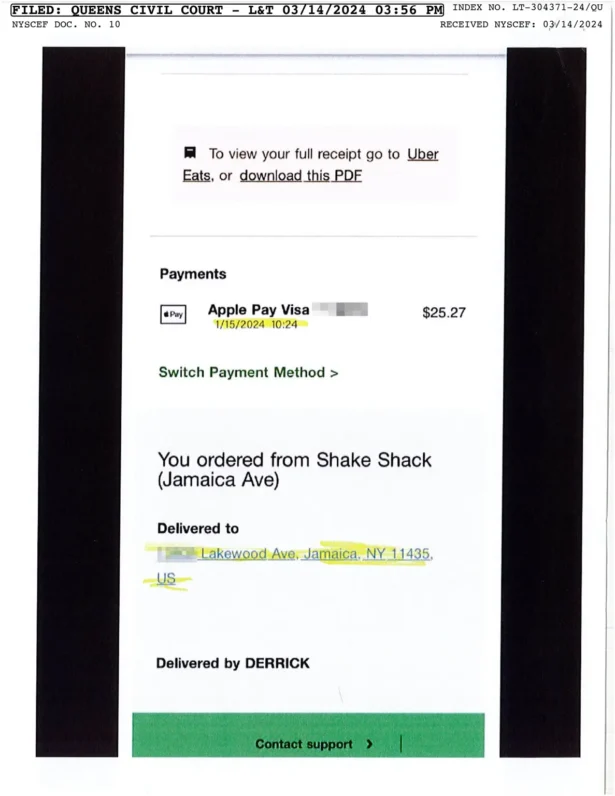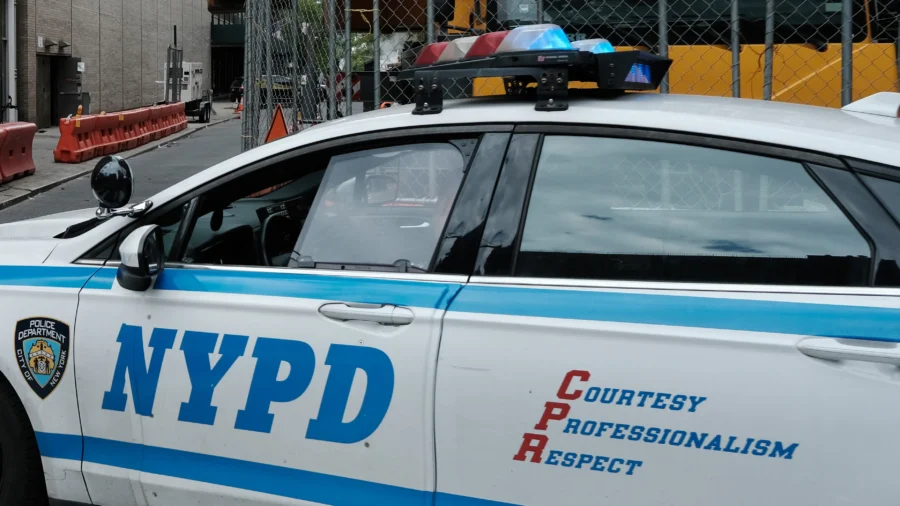A Queens Civil Court has dismissed a lawsuit brought by two men claiming home ownership of a house that they were evicted from by police after occupying it last month.
In the lawsuit, filed on March 14, the men claimed that they had been legally renting the duplex since January and that their removal was unlawful.
Hours before the hearing, the men’s attorney informed the court that they wanted to drop the case and merely wanted to get their belongings returned.
The case was discontinued with prejudice, meaning the claim cannot be refiled.
“The case is over,” the homeowners’ attorney Rizpah Morrow told reporters Friday after the ruling. “The landlords, the owners, own the house, they have possession. The people who said they were locked out have walked away from the situation. They are no longer requesting to be restored to possession and we still have their stuff,” she said.
Zero Repercussions
Homeowner Juliya Fulman, a nurse and mother of two young children, was glad that the property was now free to be rented to legitimate tenants but deplored that the two got off the hook without so much as a slap on the wrist.
“They committed a crime. They got away with it. I had to incur financial, emotional, and psychological stress with this case.”
The incident upset not just Ms. Fulman, but also the lives of the two tenants she had found for the duplex residence and who have been legally prevented from moving in all this time. One of them, a young mother and her baby, is currently living in a shelter, Ms. Fulman told The Mail; the other is a postal worker with five children, one of whom has special needs.
Real estate broker Ejona Bardhi was disappointed the squatters faced zero repercussions.
“We came prepared for a trial then they withdrew their claims without clarification,” she told The Daily Mail. “At the same time, the seller doesn’t get anything for damages, and still has to eat that one month of rent they lost out on and the legal fees that no one is reimbursing for.”
The judge told both parties’ attorneys that they would have to make their own arrangements to return the belongings of the two men that were left at the house, as this falls outside the judge’s jurisdiction.
Among the belongings left in the house are chairs, mattresses, a flat-screen TV, and a massage table.
However, Ms. Bardi fears another lawsuit may be looming if the two men were to claim that not all of their belongings are returned.
Invaded and Evicted
After years of saving, Ms. Fulman and her partner Denis Kurlyand bought and renovated the $530,000 Jamaica home. It had been up for rent when their real estate broker, Ms. Bardhi, discovered on March 4 that the locks on the property had been changed.
She inquired with the owners, who knew nothing about it.
Ms. Bardhi then returned to the property and peeked through the window. Inside, she saw a silhouette of a man wearing a hoodie. She got in her car and called the police, but then several men emerged from the house and encircled her car, she told The Daily Mail.
When the police arrived, two men, Lance Hunt and Rondie L. Francis, claimed they had been renting the place since January. As they were unable to provide proof, they left the home at the request of the police.
As Ms. Bardhi and the homeowners mentioned replacing the locks, police warned them that doing such was illegal, and they would be arrested if they did.
Within New York City, squatters enjoy a wide range of legal protections as soon as they’ve occupied a property for more than 30 days—given that the men claimed to have been there since January, the police could not allow the locks to be changed, nor could their belongings be taken out, or the house’s utilities be cut off.
Sure enough, the next day the two men returned with what they claimed was a lease agreement signed by Ms. Bardhi.
However, the owners were prepared and presented the police with ownership documents and timestamped videos showing the house had been vacant since January. The men were escorted from the property and the owners were allowed to change the locks.
Upon entering the newly renovated house, the couple said they found that the wooden floors were scuffed, there were scratches on the walls, and the whole place stank of marijuana.
Dubious Evidence
Ten days later the couple, Ms. Bardhi, and Top Nest Properties—the real estate company she works for—were served a lawsuit, accusing them of illegally evicting two legitimate tenants.
In their court filing, the two squatters presented several pieces of alleged evidence, including a signed lease agreement, several pieces of mail addressed to the home, and even a fast food delivery receipt, all dated within the timeframe the men claimed to be living there.

However, the couple claimed that the squatters’ evidence in the court filing was badly cobbled together forgery.
“They found whatever they could and threw it all together. The lease they presented is ridiculous—signed on January 1 and starting January 1,” Mr. Kurlyand said.
Perhaps it explains why the case was suddenly dropped.
Series of Incidents
The story is the latest in a series of incidents striking the Big Apple where home invaders exploit legal loopholes to claim rights to property. In March, Long Island State Assemblyman Jake Blumencranz, a Republican representing District 15, introduced a bill that would make it easier for home owners to remove squatters from the property.
The bill simply specifies that the legal definition of a “tenant” does not include squatters.
The law would also allow police to intervene and make arrests, instead of forcing property owners to go through the lengthy and costly legal system.

